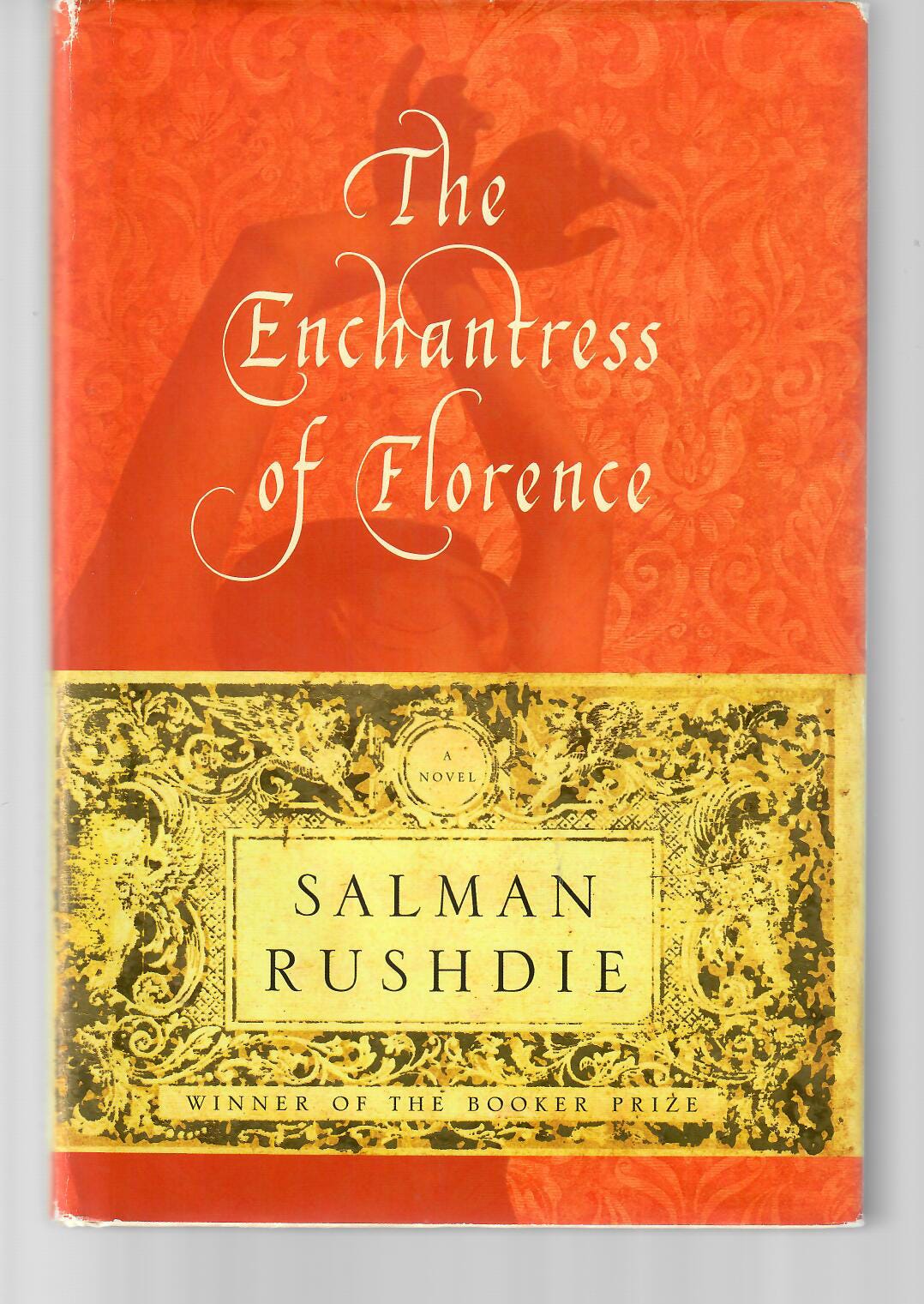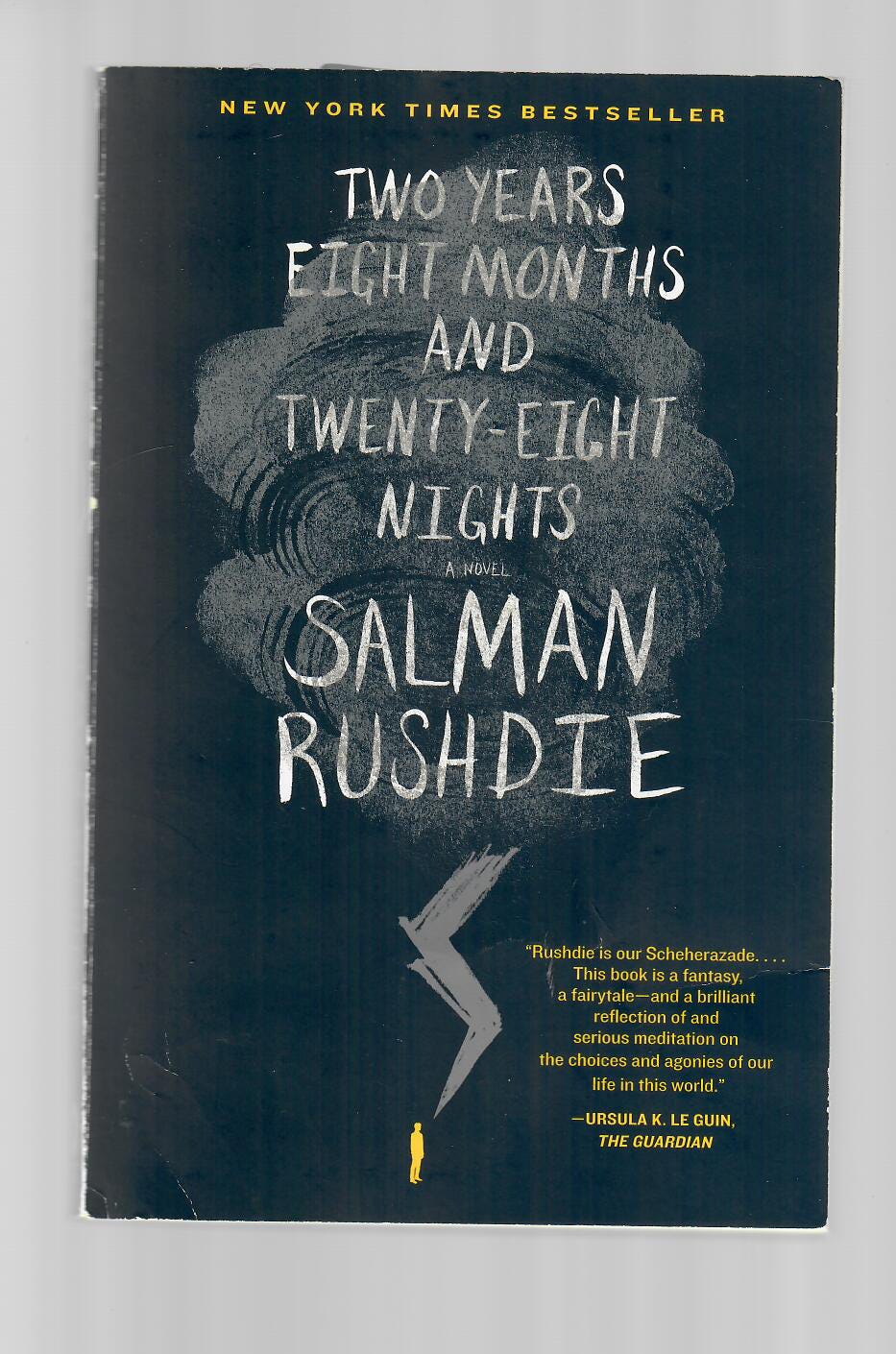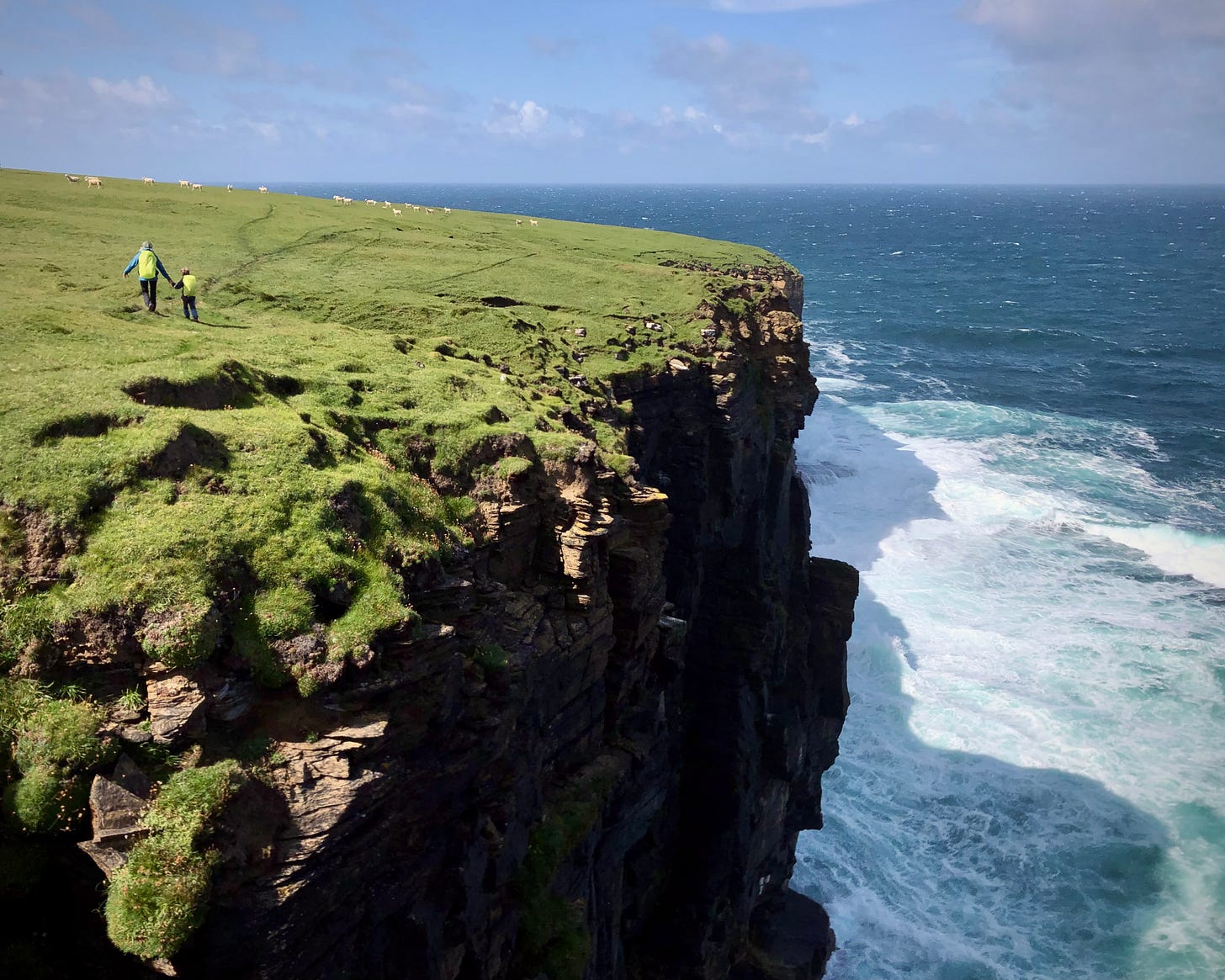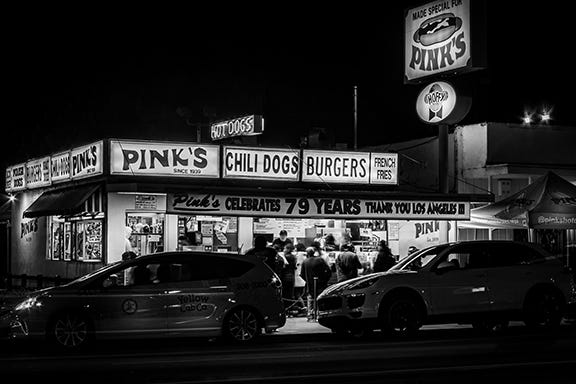What Should I Read Next?
Another Juke Smorgasbord! This time, a whole host of book recommendations from people who love to read...
We have a little tradition here at Juke. Every three months, I write to all our contributors with a question and then I publish all their answers together in one big mashup, or smorgasbord, as I like to call it. Last time, in July, the question was “Where is Home Lately?” It’s usually something open-ended like that, so that each contributor can take the question wherever they’d like. This time, though, I was looking for something more specific. For this Smorgasbord, I asked each of our contributors to recommend some reading for me. I’ve asked them a similar question before, but this time it’s slightly different. Not “what are you reading” but “what should I be reading?” The replies, of course, were just as fascinating as I’d hoped they would be.
Once you’ve read our answers, I hope you’ll be inspired to jump into the comments and share your own thoughts.
What should I read next?
I’ll begin…
Tonya Morton:
Luckily enough, I already know what I plan to read next. (I think you’d like it too, or else I wouldn’t mention it.) Lately, I’ve had a hankering to re-experience Light Years by James Salter, which I first read a couple years ago. I can’t remember who recommended it to me at the time. Most likely, I read a reference to it somewhere that sparked my interest, then I know I checked it out from the library. From the first pages, I fell head-first into the book, returning to it while I ate lunch each day or sat on the bus. I was consumed by the story for hours each night. Then, far too soon, it was done. And I missed it. I ordered a copy for myself, knowing I’d want to return to it once enough time had passed. And now I think it has.
What is it about Light Years that was so captivating? It was an atmosphere. A feeling of magic, centered on a home straddling the border between New York City’s suburbs and the countryside farther north. The family in the novel belongs to the city, its trains and department stores, the secretaries and corporate lunches of 60’s New York, but they also belonged to grain fields and horses in the pasture and this particular magical house, where they lived, imperfectly, a kind of honeyed, magical life. Other things happen in the book. Not big, dramatic things. I tend to like domestic novels where small things happen and people are altered profoundly, but slowly, by time and circumstances. I like books where no one is a villain and no one is a hero; where everyone just tries to make of life what they can.
So now I’m hoping I’ll get to feel that atmosphere again—a little differently, I imagine, on returning to the book for a second time. But even an altered taste of it would be nice right now. A little of that honeyed atmosphere, as the days tip toward winter.
Paul Vlachos:
Escapism is the order of the day lately when it comes to my reading. And it probably has always been. If I were seeking to understand the present through literature, I might recommend Rebecca West (born “Cecily Isabel Fairfield,” by the way) or Hannah Arrendt. Possibly even “What’s the Matter with Kansas,” by Thomas Frank. Oh hell, maybe even “Mein Kampf,” but trust me, I AM NOT SUGGESTING those books. In fact, I might ask you to please stay away from them for the moment. Better to just integrate the past with the present via Heather Cox Richardson’s most excellent newsletters, released pretty much every day on Substack or Facebook.
FOR THIS ASSIGNMENT, though, from our peerless leader, Madame Tonya, I would suggest my tried and true favorites, some of which I may have suggested here in past Smorgasbord columns. I like to re-read some books. They are old friends and what they do is to help me forget the present moment, to escape, either to the past or to a thing that never was, thus fulfilling the principles of escapism and transformation. In addition to my usual suggestions of Raymond Chandler, Dashiell Hammett, Lawrence Block, Isaac Babel, Varlam Shalamov, or Richard Westlake, I’d like to add the following:
“For the Union Dead,” by Robert Lowell
“On Jupiter Place,” by Nicholas Christopher
“The Arms of Krupp,” by William Manchester
“Dance of Death: The Life of John Fahey,” by Steve Lowenthal
“Gotham: The History of New York City,” by Burrows and Wallace
Or any lyrics by Chuck Berry, who should have been America’s permanent Poet Laureate.
Damon Falke:
I should recommend reading the Cazalet Chronicles by Elizabeth Jane Howard. The five volumes were published between 1990 and 2013. They capture the world of an Upper Middle Class English family, beginning from just before War World II until the 1950’s. The books are poignant, full of family, small joys, trials, and, necessarily, loss. They are books for settling into and for reading unhurriedly. They never speak cheaply or to match preconceived expectations. They are for staring out of windows (after reading, of course) and wondering what you have missed in your life or what happened to shape the center of who or where you are. The other book I should recommend is Geoff Dyer’s But Beautiful: A Book about Jazz (1991). The book is one of fictional narratives (vignettes) about some of the great Jazz men and what makes Jazz swing. It is a strong read, particularly, I suspect, for someone who lives in the City. That said, it’s a strong read for one who lives in an old house on the edge of a cold sea, as well. Imagine thin light inside a small room and within earshot is the sound of a trumpet or sax or the brief touch of a piano that, somehow, brings you back to you.
Ned Mudd:
Jim Harrison: Dead Man’s Float
Kathleen Jamie (ed): Antlers of Water
Craig Childs: Tracing Time
David Hinton: Orient
Sue Cauhape:
I just finished reading Mark Twain’s Tom Sawyer and may reread Huckleberry Finn in the near future. As my grandkids start learning to read, I’m purchasing and perusing books that my daughter and I used in her home schooling as well as others I liked as a child. The library is overflowing my shelves. but hopefully will be used by her friends’ children as well. They all live in a rural county in Nevada that has very limited recourses and a desolate community whose children endure parents who are meth addicts. There is a tiny library there that my daughter uses. Maybe most of these books will find their way there some day. Meanwhile, I’m reading and re-reading books supposedly written for young people, but adults will often find are a wonderful respite.
Tabby Ivy:
I am probably not the best person to recommend any book to another, as I find it hard to stick with a book if it doesn’t capture me from the get-go. It also takes me a while to finish a book, as sadly I just don’t allow myself hours in the day to read. I read in spurts, or during a lazy afternoon when all I want to be is lazy, or if stuck on a plane. As for what you should read next, I recommend a book that has been keeping me company for a few weeks, All The Beauty In The World, by Patrick Bringley. It came out in 2023, it is non-fiction, about Bringley’s ten-year experience as a guard at the Metropolitan Museum of Art. There is a back story about the death of his beloved older brother from cancer which was the impetus for taking the guard job at the museum. He needed a mindless escape to somewhere familiar and safe.
Bringley is a fabulous writer, he worked at the New Yorker in their editorial events office. He writes of growing up in a family where art and art museums were a part of life. He is also very observant. I loved reading about the behind the scenes workings of the Met, and the art he lived with during his rotating guard assignments throughout the museum. I google the painting/art he discusses if I’m not familiar with it, getting a bit of an art history lesson along the way. He is very observant of the art, the value of art, the people who visit the museum; where they gravitate to, and his fellow guards. He weaves into the story his life outside of work, and the impact of his brother’s death over time. It is an enjoyable read. Like an afternoon spent wandering the galleries of the Met.
And, one more - Pablo Neruda: Absence and Presence, translations by Alistair Reid, published in 1990. This is not a book of his poetry, but a beautiful archive in photos of his private world, with essays by the people who knew him best. It is lovely.
Matt Layne:
My most recent reads are Stephen Graham Jones’ The Buffalo Hunter Hunter, Chrisopher Buehlman’s The Lesser Dead, and Katherine Rundell’s sequel to last year’s Impossible Creatures, The Poisoned King. The Jones and Buehlman books are fantastic additions to your October reading list as they involve everyone’s favorite immortal creature. You know what they are. Say it! VAMPIRES! For the record, these vamps don’t sparkle, y’all. The Buffalo Hunter Hunter is a subtle creeper of a book that draws the reader in through its historical background of the cultural genocide of indigenous peoples. While The Lesser Dead is a fabulous romp through 1978 New York City’s underground (literally). Katherine Rundell’s books are much lighter fare and beautifully rendered. I highly recommend them if you are looking for holiday gifts for some young readers. Incidentally, Rundell is a John Donne scholar who happens to write children’s books.
Keep on reading and supporting your local libraries and bookstores, y’all!
Constance Christopher:
The Crying of Lot 49?
Anthony Head:
Lucky you! You asked that question at the perfect time. Because of my financial and existential capacity, I am currently subletting a walk-in closet in the suburbs of Rerun City, where nothing is new but everything has been vetted for quality. (I could live here forever and be deliriously happy, but the rents are still too high.)
I recommend reading two books from Salmon Rushdie, a writer of enormous talent and skill. There’s no navel-gazing with Rushdie. His prose actively grabs my attention and holds it for exactly as long as he wishes. Within the span of a single sentence this master storyteller conjures history and myth, consciousness and the spectrum of human emotions, the vastness of a single thought and the confinements of our mighty universe. He’s that good.
The Enchantress of Florence (2008) is a captivating novel that takes place mostly in the Mughal Empire of South Asia and the city of Florence, Italy, in the late 1500s. The central plot holds together several subplots involving characters that never leave this reader’s imagination even when they’re not on the page. It’s a vivid tapestry of interconnected tales, empathetic to the spectrum of truths every person holds close, and it’s redolent with the perfumes and spices of royal court intrigue.
This is the only book of fiction I can recall reading that includes a bibliography. With it, I think, Rushdie was providing another gift to his reader: I made up this fantastical tale just for you—but you must trust me that only some of the story is make-believe.
There’s no good way of describing Rushdie’s Two Years Eight Months and Twenty-Eight Nights (2015) because, I fear, to begin the attempt would inadvertently wipe away much of its greatness. I’m only just beginning to read it (again) but I remember that it involves jinn and jinnias, those fantastical beings composed of smokeless fire, who have lost much of their patience with humanity. (And who could blame them?)
While all that magnificent supernatural fun is getting sorted out there is an ongoing, very heated debate between two philosophers about good and evil and other basic suppositions we wake up to every morning. Even more fascinating than the subjects they argue about is the fact that one philosopher died 70 years before the other was born.
Since we are all living through an era of magical surrealism, these two novels feel like they are the tomes of our times. They very well could be—but I’m only recommending them now because I don’t make a lot of money as a writer, which forces me to re-read the world’s great literature. I could have worse problems.
##
Charlie Pepiton:
“His dreamtime is all but over, and when a child begins to think that his imaginings, his weaving of stories, are idleness, then everything about him is touched by the light of common day – that is, by the cold finger of time and mortality.” – from Beside the Ocean of Time by George Mackay Brown
This summer we ended our travels with a long walk, the St. Magnus Way, a 60ish mile meandering circuit around mainland Orkney and the island of Egilsay. Like any good walk of its kind, if you do it right, you encounter more than a landscape. We arrived on the island just as Storm Floris blew into the North Atlantic, and in its wake, we hiked through 40 mph winds for the first few days. Our 7-year-old son, made the journey with minimal protest, I’m relieved and proud to say, and a head full of musings.
“Look how close to the cliff this sheep poop is! Do they ever fall in the water? Look at this red wool! Why do they paint them?” We all wondered at the 900-year-old story of murder and miracle where Magnus Erlendsson meets the wrong end of a kitchen axe, an act of sacrifice that left flowers to bloom among the rocks where he fell. Later, village folk erected standing stones to mark the spot where his remains touched the ground as they carried him from the churchyard in Birsay to the cathedral, newly built in his honor, in Kirkwall. “Why did they build that fence around that stone? Are they keeping it in or us out?” We crawled through a tomb where villagers were interred 5000 years ago cradling the bodies of their beloved dogs. “Turn off your headlamp, Papa!” As it turns out, it doesn’t get darker than the inside of a stone age tomb cut deep into a Scottish heath. There were stretches of that hike that seemed to come to a standstill even as we moved through a seemingly unending field of purple heather along the Scapa Flow. “Quick, come see this skull! Look, a jawbone. A hare? I thought a rabbit.” We swam, albeit quickly, in Hamnavoe Bay. “No, you go first!” This only after sweating it out at 180º in a sauna made from a horse trailer in Stromness.
On our way to the bay, we passed the birthplace of George Mackay Brown, and I recalled having read something or other by him as a student, but in the six weeks after our walk, I read his first poetry collection The Storm and Other Poems and his novel Beside the Ocean of Time. I’m still making my way through The Collected Poems of George Mackay Brown. Like our pilgrimage, his writing is slow going, and necessarily so, but it is no slog. His poems just bring me to a stop.
From “Chorus: Soon Spring Will Come”
“What happy men we are, if we only knew it!
Like fallen seeds hoarding our darkened strength
For the long pilgrimage on perilous roads
That crowd so thick to death, we soar at length,
God-ripe above time’s ruined labyrinth.”
Patrick McCarty:
A good friend of mine sent me a couple of books recently. He is a successful lawyer in a resort town in a Western state, but before that, he was a punk rocker. Actually, he is still a punk rocker - just an old one with a good day job.
This friend likes the way I write and wants to write a song with me. I have not been writing much of anything lately. I do not know how to write a song. In fact, I do not believe I am a good enough writer to write poems, much less song lyrics. Nevertheless, I am trying. I wrote one set of lyrics, just to see what would happen. He intends it to be a fierce, anthemic thing. The result of my first attempt focused on a bat, flying around in a desert somewhere. I will succeed some day, just probably not today. Or tomorrow.
I showed him the bat lyrics. He suggested I listen to a lot of The Clash for about a week and then see what happens. But I have found that I either tend to listen to a lot of Bad Brains, who’s lyrics are largely indecipherable, or to the same instrumental song, over and over again. I do not know why I can’t stop listening to this one song (Gold Dust, by Duster, from 1998), and I have now been listening to it for over two months, many times a day. I believe I am in a liminal state. Perhaps this song is the soundtrack to that state.
All this is to say that I absolutely love the books that he sent me. They are all by the same author, Willy Vlautin. I get completely absorbed in them. My favorite so far is called The Horse. The way the author describes places and people reminded me that I, too, can write, if I get out of my own way. And I have been in my way a lot this year.
Luciano Conte:
Nicomachean Ethics is the book I’ve been revisiting these past few weeks.
Arguably the original self-help book. Though the phrase is bit too thin because it builds no system of rules nor does it promise fleeting satisfaction. Instead, it offers a way: habits of character, practiced and chosen, drawing the self toward what endures.
Why read Aristotle now? Because each day presents what we too often take for granted, the blunt fact of decision: how to act, what to value, how to meet another’s gaze. Habit and instinct, the noise of culture, the pattern of yesterday. These are what guide most actions, unseen as they may be. Aristotle proposes something else: a framework for living that survives centuries precisely because it refuses shortcuts and illusions.
The question is not happiness, if happiness means passing pleasure, but eudaimonia: flourishing that is hard-won, resting in the continual work of character and the full use of what is human in us. The text does not soothe. It offers practice, not advice.
Aristotle rejects the easy wisdom of opposites. Courage is not the absence of fear: that’s recklessness. Nor is it retreat or passivity. It is the hard-seeking of the mean, a judgement forged by repetition and testing. So with generosity, never waste nor stinginess; with confidence, never arrogance nor self-effacement; with presence, never aggression nor withdrawal.
In an age shaped by absolutes and abstractions, this thinking regains its edge. Virtue ethics asks not “what are my rights?” nor “what produces the greatest gain?” but “what would a good character do, here?” Shifting the focus away from policy but toward the integrity of the agent, the community taking shape in our acts.
The book is unvarnished, almost like lecture notes, but grave with purpose. Every page returns to practice: virtue as a cultivated habit, never a rule. This is the method by which character emerges, slow and real.
The Ethics compels us to look again at what we think we know: what goodness is, how it’s built, what it costs. There is no substitute for this work, whether in the quarrel and compromise of the workplace or the silences of family.
Kirk Weddle:
Lately, I’ve been reading a lot of memoirs and cookbooks. But, for pure pleasure, I read Michael Connelly’s crime novels. They all take place in LA. A town I know really well.
When I was coming up as a photographer, I lived all over LA: Chinatown, Downtown, Koreatown, Hollywood, Silver Lake, Pasadena, Altadena, and even the Valley. When I lived there, I had three cars stolen (one I stole back), had all my camera gear ripped off, had a house burglarized, and another vandalized. I had numerous violent confrontations and near misses.
Before Connelly was a novelist, he wrote about crime for the L.A. Times. And he really knows his stuff and understands the town. He writes about the taco trucks, hot dog stands, dive bars, and eateries. And the earthquakes and riots, and the freeways that are always packed. He has real knowledge of cops, criminals, and gang bangers. All his books are a treat to read. I have read all his stuff. He’s just better than most of the writers of that genre.
So, put your feet up, switch on Art Pepper on the turntable, pour yourself a glass of bourbon, open up The Black Echo, and travel back to LA in the 90s.
If you enjoyed this post, hit the ♡ to let us know.
If you have any thoughts about it, please leave a comment.
If you think others would like it, hit re-stack or share:
If you’d like to read more:
To help create more Juke, upgrade to a paid subscription (same button above). Otherwise, you can always contribute a one-time donation via Paypal or Venmo.






Thank you, Tonya, and all the writers on Juke for these experiences with books. Each of these was more than a list of books. They were peeks into our lives and how books affect us.
Great comments and suggestions. And the joy of reading great writing and stories of all sorts. Thanks all. C.